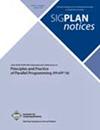Wonderland
Q1 Computer Science
引用次数: 15
Abstract
Many important graph applications are iterative algorithms that repeatedly process the input graph until convergence. For such algorithms, graph abstraction is an important technique: although much smaller than the original graph, it can bootstrap an initial result that can significantly accelerate the final convergence speed, leading to a better overall performance. However, existing graph abstraction techniques typically assume either fully in-memory or distributed environment, which leads to many obstacles preventing the application to an out-of-core graph processing system. In this paper, we propose Wonderland, a novel out-of-core graph processing system based on abstraction. Wonderland has three unique features: 1) A simple method applicable to out-of-core systems allowing users to extract effective abstractions from the original graph with acceptable cost and a specific memory limit; 2) Abstraction-enabled information propagation, where an abstraction can be used as a bridge over the disjoint on-disk graph partitions; 3) Abstraction guided priority scheduling, where an abstraction can infer the better priority-based order in processing on-disk graph partitions. Wonderland is a significant advance over the state-of-the-art because it not only makes graph abstraction feasible to out-of-core systems, but also broadens the applications of the concept in important ways. Evaluation results of Wonderland reveal that Wonderland achieves a drastic speedup over the other state-of-the-art systems, up to two orders of magnitude for certain cases.仙境
许多重要的图应用都是迭代算法,反复处理输入图直到收敛。对于这样的算法,图抽象是一项重要的技术:虽然比原始图小得多,但它可以引导一个初始结果,可以显著加快最终的收敛速度,从而获得更好的整体性能。然而,现有的图形抽象技术通常假设全内存或分布式环境,这导致了许多阻碍应用程序到核外图形处理系统的障碍。本文提出了一种新的基于抽象的离核图形处理系统Wonderland。Wonderland有三个独特的特点:1)一种适用于外核系统的简单方法,允许用户在可接受的成本和特定的内存限制下从原始图形中提取有效的抽象;2)支持抽象的信息传播,其中抽象可以用作连接磁盘上不相交的图分区的桥梁;3)抽象引导优先级调度,在处理磁盘上的图分区时,抽象可以推断出更好的基于优先级的顺序。Wonderland是最先进技术的一大进步,因为它不仅使图形抽象在核心外系统中可行,而且还以重要的方式拓宽了该概念的应用。Wonderland的评估结果显示,与其他最先进的系统相比,Wonderland实现了极大的加速,在某些情况下可达到两个数量级。
本文章由计算机程序翻译,如有差异,请以英文原文为准。
求助全文
约1分钟内获得全文
求助全文
来源期刊

ACM Sigplan Notices
工程技术-计算机:软件工程
CiteScore
4.90
自引率
0.00%
发文量
0
审稿时长
2-4 weeks
期刊介绍:
The ACM Special Interest Group on Programming Languages explores programming language concepts and tools, focusing on design, implementation, practice, and theory. Its members are programming language developers, educators, implementers, researchers, theoreticians, and users. SIGPLAN sponsors several major annual conferences, including the Symposium on Principles of Programming Languages (POPL), the Symposium on Principles and Practice of Parallel Programming (PPoPP), the Conference on Programming Language Design and Implementation (PLDI), the International Conference on Functional Programming (ICFP), the International Conference on Object-Oriented Programming, Systems, Languages, and Applications (OOPSLA), as well as more than a dozen other events of either smaller size or in-cooperation with other SIGs. The monthly "ACM SIGPLAN Notices" publishes proceedings of selected sponsored events and an annual report on SIGPLAN activities. Members receive discounts on conference registrations and free access to ACM SIGPLAN publications in the ACM Digital Library. SIGPLAN recognizes significant research and service contributions of individuals with a variety of awards, supports current members through the Professional Activities Committee, and encourages future programming language enthusiasts with frequent Programming Languages Mentoring Workshops (PLMW).
 求助内容:
求助内容: 应助结果提醒方式:
应助结果提醒方式:


